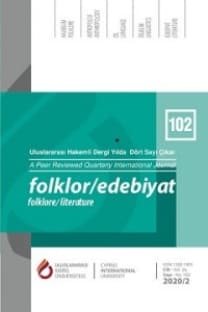Foucauldian “Medical Gaze” as an Ideological Apparatus of Modern Power Structures in the Works of Rıfat Ilgaz, Ōoka Shōhei, Jean-Paul Sartre and Joseph Conrad
the medical gaze, disease, modern power structures
___
Abe, K. (2001). The box man. New York: Vintage.Conrad, J., and Murfin, R. (1996). Heart of darkness: Complete, authoritative Text. London: Palgrave.
Deleuze, G., and Guattari, F. (1994). What is philosophy? New York: Columbia University.
Dubos, R. (1987). Mirage of health: Utopias, progress, and biological change . New Jersey: Rutgers University.
Dumas Fils, A. (1856). La dame aux camélias. Paris: Michel Lévy Frères.
Flaubert, G. (2004). Madame Bovary-provincial manners. New York: Oxford University.
Foucault, M. (2003). The birth of the clinic-an archaeology of medical perception. New York: Routledge.
Güven, D. Ç. (2016). Dünya edebiyatında “amansız hastalık” söylemi -Sontag, Karatani ve Dumas Fils Örneklerinde. Turkish Studies, 415-432.
Hardy, T. (2003). Jude the obscure. New York: Oxford University.
Ilgaz, R. (2014). Karartma geceleri. İstanbul: Çınar.
Karatani, K. (1998). Origins of modern Japanese literature. Durham: Duke University.
Mann, T. (2005). The magic mountain. New York: Every Man’s Library.
Ooka, S. (2001). Fires on the plain. North Clarendon: Tuttle.
Orwell, G. (2008). 1984. London: Penguin.
Sartre, J.-P. (1969). The wall, and other stories. New York: New Directions.
Sontag, S. (1978). Illness as metaphor. New York: Farrar, Straus and Giroux.
Watt, D. (1989). How war came: The immediate origins of the second world war, 1938–1939. London: Heinemann.
Weinberg, G. (2005). A world in arms. Cambridge: Cambridge.
- ISSN: 1300-7491
- Yayın Aralığı: 4
- Başlangıç: 1994
- Yayıncı: -
Çelen Dimililer, Mustafa Kurt, Ahmet Güneyli, Ezgi Gömeçli Ulu
Kültür Turizmi Bağlamında Mekânın Ötekileştirilmesi ve Yeniden Üretimi Örneği: Beypazarı Evleri
Roxelane Imaginée : Étude Sur L’image Contemporaine D’une Sultane
Yer Adları Açısından Bir İnceleme: Tosya’da (Kastamonu) Yer Adları
